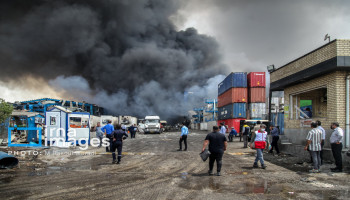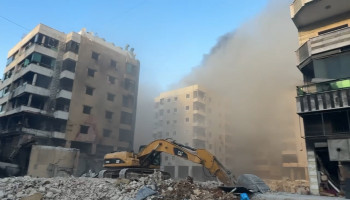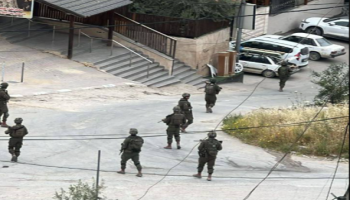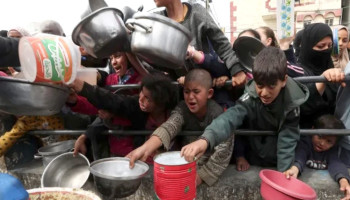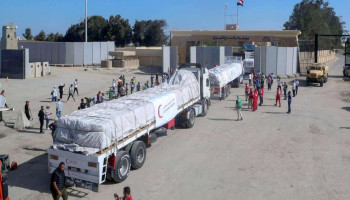Putin: US Went in for New Arms Race, Forced Russia to Develop Weapons
الجمعة, 18 ديسمبر 2020

Russian President Vladimir Putin says it was the United States that started a new arms race, forcing Russia to develop hypersonic weapons in response.
Asked about the risk of a new arms race, the Russian leader said in his annual news conference on Thursday, "It happened already, and this is obvious."
Putin said he believed US President-elect Joe Biden is open to dialog on the issue, but “we need some reaction from our American partners.”
The Russian president had earlier urged the White House to agree on a one-year extension of the New START treaty, which is the last major nuclear arms control treaty between Moscow and Washington that puts a limit on the development and deployment of strategic nuclear warheads of both countries.
During his Thursday conference, Putin reiterated his call, urging Washington to extend the New START arms control treaty for one year.
"Now there is also a threat that Strategic Arms Reduction Treaty is terminated. This would mean there are no more restrictions to the arms race, none, at all. We have called and continue to call upon our western partners to prolong this treaty for at least a year. During this year we would have substantive, as diplomats say, talks on what to do next and how to live on."
Back in July 1991, the START which later was called the START I, was signed by then US president George H. W. Bush and Mikhail Gorbachev, the last president of the Soviet Union, barring both countries from deploying more than 6,000 nuclear warheads atop a total of 1,600 intercontinental ballistic missiles (ICBMs) and bombers.
In January 1993, President Bush and Boris Yeltsin, the former Russian president, signed START II, but it collapsed and never entered into effect.
The START I treaty expired in late 2009 and its replacement, called the New START or START III, was signed in April 2010 by former US president Barack Obama and then Russian president Dmitry Medvedev, under which both sides agreed to halve the number of strategic nuclear missiles and restrict the number of deployed strategic nuclear warheads to 1,550.
The treaty can be extended for another five years, beyond its expiry date in February 2021, by mutual agreement.
Outgoing US President Donald Trump had maligned the treaty early in his presidency as “one of several bad deals negotiated by the Obama administration.”
Last year, Trump also withdrew his country from the Intermediate-Range Nuclear Forces Treaty (INF), which had been signed between Washington and Moscow in 1987. The landmark treaty had banned all land-based missiles with a range up to 5,500 kilometers.
The US’s withdrawal came after it accused Russia of secretly violating the agreement. Russia, which has repeatedly rejected the allegation, stopped implementing the INF after the US left it.
Last December, Washington tested for the second time in four months a ground-launched, nuclear-capable missile from the Vandenberg Air Force Base near Los Angeles, California.
The launch of the missile, which flew for more than 500 kilometers, had been banned under the Cold War-era agreement.
Back in July, Putin announced a boost in Russia’s military equipment, saying the Navy would be armed with hypersonic nuclear strike weapons, underwater nuclear drones as well as 40 new ships and vessels this year.
He said a new generation of “unequaled” Russian nuclear weapons could hit almost anywhere in the world.
'Navalny not worth poisoning'
Putin also said on Thursday that the unfounded poisoning scenario of opposition politician Alexei Navalny was in fact part of a US-backed plot, repeated by media, to try to discredit the Russian leader.
He stressed that Navalny was not important enough to be a target.
Navalny, 44, was taken ill on a domestic flight on August 20. He was later transported to the German capital, where he received treatment at Berlin’s Charite Hospital until recovery.
German doctors, however, claimed Navalny had been poisoned with a substance from the group of cholinesterase inhibitors. Since then, Germany and other Western governments have been attacking Russia with accusations that it poisoned Navalny.
Moscow has repeatedly and strongly rejected the allegation.
On Monday, investigative website Bellingcat and Russian media outlet The Insider published results of a joint investigation conducted in cooperation with Der Spiegel and CNN, offering a new version of the allegation.
It claimed that a team of assassins from Russia’s FSB security service had stalked Navalny for years until they allegedly managed to poison him.
Putin strongly dismissed the so-called investigation, stressing that it was made up of information provided by US intelligence services.
“It’s a trick to attack the leaders (of Russia),” Putin told the annual news conference.
The Russian president said Navalny enjoyed the support of the US intelligence, thus, the Russian security agents kept an eye on him. “But that absolutely does not mean he needs to be poisoned. Who needs him?” he added.
“If someone had wanted to poison him they would have finished him off,” Putin said.
The Russian leader did not mention Navalny by name. Instead, he only referred to him as “the patient from the Berlin clinic.”
Source: Press TV
Y.A

